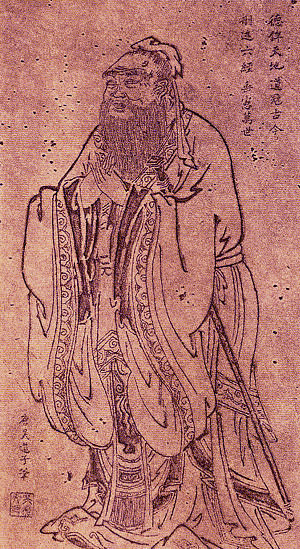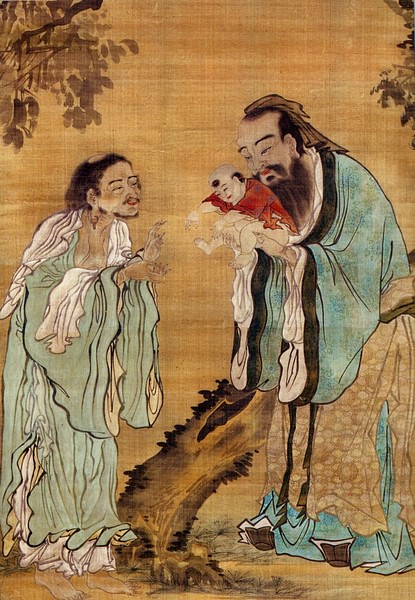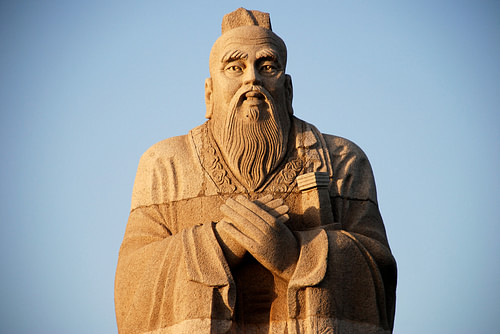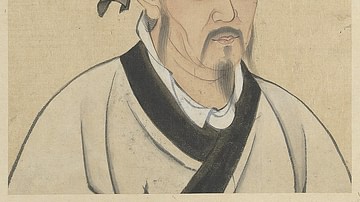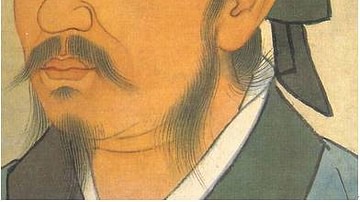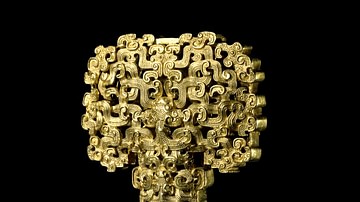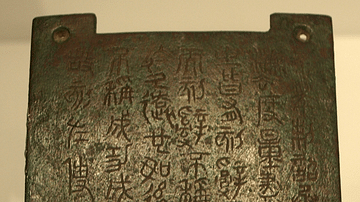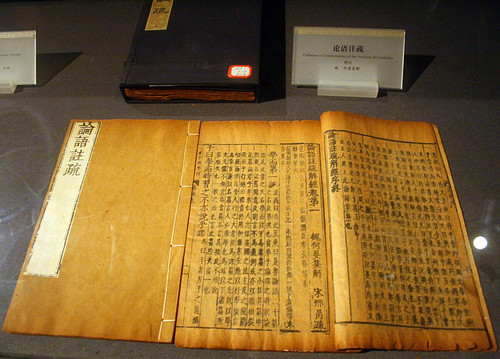
Confucianism is a philosophy developed in 6th-century BCE China, which is considered by some a secular-humanist belief system, by some a religion, and by others a social code. The broad range of subjects touched on by Confucianism lends itself to all three of these interpretations depending on which aspects one focuses on.
The philosophy is based on the belief that human beings are essentially good, that they engage in immoral behavior through lack of a strong moral standard, and that adherence to an ethical code, and rituals which encourage it, enabled one to live a productive and tranquil life of peace which would translate to a strong, ethical, and prosperous state.
It was founded by Confucius (K'ung-fu-Tze, Kong Fuzi, “Master Kong”, l. 551-479 BCE), a Chinese philosopher of the Spring and Autumn Period (c. 772-476 BCE). Confucius is considered among the greatest philosophers of the Hundred Schools of Thought (also given as the Contention of the Hundred Schools of Thought) which references the time during the Spring and Autumn Period and Warring States Period (c. 481-221 BCE) when various philosophical schools contended with each other for adherents. He is, without a doubt, the most influential philosopher in China's history whose views, precepts, and concepts have informed Chinese culture for over 2,000 years.
Confucius himself claimed to have written nothing and offered nothing new, insisting his views were taken from older works (known as the Five Classics) he was just popularizing through his school. The later Confucian philosopher and scholar Mencius (Mang-Tze, l. 372-289 BCE), however, attributed the Five Classics to Confucius, a view that continued to be held until the mid-20th century CE. These works, three others on Confucian thought, and one by Mencius make up The Four Books and Five Classics which have been the foundational texts of Chinese culture since the time of the Han Dynasty (202 BCE-220 CE) when Confucianism was made the state philosophy. The Four Books and Five Classics are:
- The Book of Rites (also given as The Book of Great Learning)
- The Doctrine of the Mean
- The Analects of Confucius
- The Works of Mencius
- The I-Ching
- The Classics of Poetry
- The Classics of Rites
- The Classics of History
- The Spring and Autumn Annals
The Five Classics are attributed to writers of the Zhou Dynasty (1046-256 BCE) which was in a period of decline during Confucius' lifetime. It may be that he did edit or revise the Five Classics, as tradition has held, but, even if he did not, he certainly popularized their concepts. His Analects, Books of Rites, and Doctrine of the Mean were written by his students based on his lectures and class discussions.
The Warring States Period concluded with the victory of the state of Qin over the others and the establishment of the Qin Dynasty (221-206 BCE) which adopted the philosophy of Legalism and banned all others. Confucian works were outlawed and burned along with those of any other non-Legalist philosophers. Copies of the banned works only survived because they were hidden by intellectuals at great personal risk. The Han Dynasty, which succeeded the Qin, encouraged greater freedom of speech, established The Four Books and Five Classics as required reading for administrative positions which led to a wider dissemination of Confucian thought which would seamlessly blend with Chinese culture after the Han declared it the state philosophy.
Historical Background & Career in Lu
Shortly after its founding, the Zhou Dynasty decentralized the Chinese government by sending lords, loyal to the king, to establish their own states throughout the vast territory. This policy worked well at first, but eventually, the states grew more powerful than the king, and the old loyalties were forgotten. By c. 771 BCE, the Zhou Dynasty was already weakened almost to the point of irrelevancy when barbarian invasions forced the government to move east for better defense. This was the end of the so-called Western Zhou period (1046-771 BCE) and the beginning of the Eastern Zhou period (771-256 BCE) which corresponds to the Spring and Autumn Period and early Warring States Period during which Confucius lived and taught.
Confucius was born in September 551 BCE in the village of Qufu, State of Lu (Shandong Province), the son of a military commander named Kong He who was of noble descent. Confucius' birth name was Kong Qui, but he would later be addressed as Master Kong (Kong Fuzi) which was Latinized by 16th-century CE Christian missionaries to Confucius. His father died when he was three years old and the resultant loss of income led to a life of poverty. He later attended school while working various jobs to support himself and his mother until she died when he was around 23 years old. By this time, he was already married and had at least one son and possibly two daughters.
He had been provided with basic education, as defined by the Zhou Dynasty, in the Six Arts – Rites, Music, Archery, Charioteering, Calligraphy, and Mathematics – but had taken it upon himself to improve on his knowledge in all of these through private study. Scholar Forrest E. Baird notes, “possessed of a deep love of learning by age fifteen, Confucius became one of the best-educated men of the day by his mid-twenties” (284). Married, and with a family to support, Confucius took the qualifying exam for government work as a teacher and, as Baird notes, pursued his goal of a meaningful life in a worthy profession:
His threefold professional goal crystalized early – to serve in government, to teach others, and to transmit to posterity the splendid culture of the Zhou Dynasty…He had a special fondness for poetry and music and was skilled in the performance of the latter. His reputation for excellent teaching was established by the age of thirty. As a teacher, Confucius rejected vocationalism while pioneering a liberal education that was strong in ethics, history, literature, and the fine arts. He admitted any student who could afford the token tuition – a bundle of dried meat. (284)
Confucius taught and also was involved in government at the local level, at one point serving as magistrate (or governor) of his town under the administration of the Duke of Lu. A political struggle among three of the leading families and the Duke of Lu's personal failings caused Confucius to lose interest in his work in Lu. He had attempted to teach the ruling class that they could live happier, more fulfilling lives by observing right conduct in accordance with a moral code which would result in effective and just government, but the upper class was not interested in following his advice. He resigned from his position and left the state of Lu to try making converts elsewhere.
This was a chaotic era in which the states fought each other for supremacy and many of the long-established aspects of government, including bureaucratic positions, lost cohesion. Administrators, advisers, scholars, and teachers who once held government posts, found themselves jobless and so established their own schools based on their personal philosophies. Some of these were actual schools in which students would enroll and attend classes while others were more “schools of thought” or movements but, collectively, their efforts to attract students to their system while discrediting others' would later become known as the time of the Hundred Schools of Thought.
Confucius & the Hundred Schools
The term Hundred Schools of Thought should be understood figuratively to mean “many”, not literally one hundred. Among the ones which were recorded by later historians, such as Sima Qian (l. 145-135-86 BCE), were:
- Confucianism
- Taoism
- Legalism
- Mohism
- School of Names
- Yin-Yang School
- School of Minor Talks
- School of Diplomacy
- Agriculturalism
- Syncretism
- Yangism (Hedonist School)
- Relativism
- School of the Military
- School of Medicine
At this time, then, Confucianism was only one of many establishing a philosophical belief system which, for the most part, they then tried to popularize. After Confucius left his position in Lu, he traveled through other states vying with proponents of the different schools for acceptance of his vision over theirs. Baird comments:
Confucius wandered through the neighboring states in the company of a small band of students, whom he continued to teach. He offered advice on government matters to local rulers and sometimes accepted temporary posts in their service. There were hardships to be endured – rejection, persecution, even attempted assassination. (284)
He had no more luck convincing the upper class of these other states of the value of his system than he had had in Lu and so returned home at the age of 68 and set up his own school. He based his curriculum on the Five Classics of the Zhou Dynasty and continued teaching until his death, of natural causes, five years later. His philosophy, at the time of his death, remained no more than one school of thought among many and was influenced, to greater or lesser degrees, by these others.
Taoism influenced Confucianism through its concept of the Tao, the creative and binding force of the universe; Legalism through its insistence on law and ritual as the means of maintaining order and controlling people's negative impulses; the School of Names through its focus on how closely the word for an object or concept corresponded to it (how well words represented the reality they referenced); the School of Medicine through its emphasis on the importance of diet in maintaining health and a clear mind. Confucius was influenced by all of these, and no doubt many others, but streamlined the thought, eliminating what he felt was non-essential or problematic, to develop a philosophical system which, if observed, could help people make better choices, lead more peaceful lives, and avoid the kind of suffering everyone at the time was enduring due to the wars between the states.
Confucianism
His philosophical vision was very simple: human beings were innately good, 'good' being defined as understanding the difference between right and wrong, and inclined naturally to choose what is right. This claim could be proven by how people reacted to others in times of trouble. The best-known example of this concept (given by the later Confucian Mencius) is a person coming across a young boy who has fallen into a well. One's first impulse is to save the boy – either by direct action or by running to find someone to help – even though one does not know the boy or his parents and might be risking one's own safety in trying to help him.
In cases where one did neither of these things – in other words, where one chose wrong over right – it was due to ignorance of what was right owing to a lack of a moral code and standard of conduct. Someone who would allow the boy to drown in the well would most likely have done so out of an overly developed sense of self-interest. If such a person were educated in right action and a proper understanding of the world and their place in it, they would choose right over wrong.
This is where the theological aspect comes in which encourages some to interpret Confucianism as a religion. Confucius believed in the Chinese concept of Tian (Heaven) which should be understood in this case as something quite close to the Tao. Tian is the source of and sustainer of all life which created the ordered world out of chaos. One needed to recognize the existence of Tian, a constant flux of Yin and Yang (opposite) forces, in order to understand one's place in the world. Sacrifices made to the various gods made no difference to those gods, who were all aspects of Tian, but made a significant difference to the one offering the sacrifice because belief in a higher power, whatever form it took, helped to check one's concept of self-importance, reduced one's ego, and encouraged one to move from self-interest to consider the interests and welfare of others.
A belief in a higher power alone was not enough to encourage right action, however, nor to control one's baser instincts. Confucius advocated a strict code of ethics one should adhere to in order to maintain the middle way in life of peace and prosperity. These are known as the Five Constants and Four Virtues:
- Ren – benevolence
- Yi – righteousness
- Li – ritual
- Zhi – knowledge
- Xin – integrity
- Xiao – filial piety
- Zhong – loyalty
- Jie – contingency
- Yi – justice/righteousness
All of these were equally important, but they began with filial piety. People were encouraged to honor and respect their parents and observe a hierarchy of authority where a son obeyed his father's wishes, a younger brother respected and deferred to his older brother, and women did the same with men. In this way, the family would live harmoniously and, if enough families embraced filial piety, one would soon have a whole community of contented people, then a state, and then an entire country. There would be no need of oppressive governments or laws because people would, essentially, be governing themselves through recognition of the benefits of virtuous behavior. Confucius writes:
If the people be led by laws, and uniformity sought to be given them by punishments, they will try to avoid the punishment, but have no sense of shame. If they be led by virtue, and uniformity sought to be given them by the rules of propriety, they will have the sense of shame and, moreover, will become good. (Analects, 2.3; Tamblyn, p. 3)
By embracing filial piety, one was taking the initial step toward the other constants and virtues because one was subjecting one's self to a policy of behavior that did not elevate the self. Even the head of the household, the father, was expected to be humble, in his case in the face of Tian. No one was above observance of filial piety in accordance with righteousness. In responding to a question regarding government and control of unruly subjects, Confucius is reported as saying:
Let your evinced desires be for what is good, and the people will be good. The relation between superiors and inferiors is like that between the wind and the grass. The grass must bend, when the wind blows across it. (Analects 12.19; Tamblyn, p. 38)
Filial piety (and the rest) was informed by Ren which means not only 'benevolence' but that which makes a human truly human, one's basic humanity, which understands right from wrong and instinctively leans toward what is right. Expressed in behavior, Confucius coined the so-called Silver Rule, a much earlier version of the Golden Rule attributed to Jesus Christ ('silver' because the concept is expressed in the negative), when he said, "whatsoever you do not want done to you, do not do to another" (Analects 12:2) which appears in his response to a question on defining perfect virtue:
It is, when you go abroad, to behave to every one as if you were receiving a great guest; to employ the people as if you were assisting at a great sacrifice; not to do to others as you would not wish done to yourself; to have no murmuring against you in the country, and none in the family. (Analects 12:2; Tamblyn, p. 36)
By adhering to these precepts, in accordance with the rituals which encouraged them, one would attain the state of junzi (literally “lord's son”) which meant a superior individual and is usually translated as 'gentleman'. A junzi recognized the order of the world and his – or her – place in it (since Confucius understood women as in need of as much instruction as men, although his era did not allow for it formally) and, through adherence to Confucius' teachings would behave well, in the interests of all involved, and live in peace with one's self and others.
Conclusion
Confucius' philosophy was reformed and popularized by the philosopher and Confucian scholar Mencius who, like Confucius himself, traveled state-to-state preaching Confucian ideals in an effort to end the chaos of the Warring States Period. His efforts at converting the ruling class were no more successful than those of Confucius but he did introduce Confucian precepts to a wider audience than it had at Confucius' death. Confucianism's cause was furthered by another scholar-philosopher, the last of the Five Great Sages of Confucianism, Xunzi (also given as Xun Kuang, l. c. 310 - c. 235 BCE) who reformed the system further, offering a much more pragmatic (or pessimistic) vision of the philosophy, closer in some aspects to Legalism, but still retaining the basic precepts, which he expressed in his work Xunzi.
Confucianism was rejected by the Qin Dynasty because it was critical of Qin policy. The first emperor of the Qin Dynasty, Shi Huangdi (r. 221-210 BCE), established a repressive regime, completely at odds with Confucian ideals, and adopted Legalism as the state philosophy in order to strictly control the populace. Confucianism was almost erased from history during the time known as the Burning of the Books and the Burying of Scholars c. 213-210 BCE, but the books were preserved by adherents who hid them from authorities.
The philosophy was revived by the Han Dynasty under its first emperor Gaozu (r. 202-195 BCE) who reestablished the values of the Zhou Dynasty. Confucianism was later made the national philosophy under Wu the Great. By the time of his reign, 141-87 BCE, Confucianism had already gained a substantial following, but Wu's decree would solidify and expand its influence.
For the next 2,000 years, Confucianism would be the dominant philosophy of China, even during periods – such as the Tang Dynasty (618-907 CE) – when Taoism was more popular. In the 20th century CE, Confucianism was rejected by Chinese cultural reformers who felt it was outdated and by the Chinese Communist Party because of its insistence on a social hierarchy at odds with the communist ideal. Mohism, with its vision of universal love regardless of social standing, was advocated instead.
By this time, however, Confucian ideals had become so closely interwoven with Chinese culture that there was no way of separating the two. Confucianism continues to be observed, whether directly as a belief-system-of-choice or simply culturally in the present day and continues to gain adherents around the world. Of the many philosophies of the so-called One Hundred Schools of Thought, Confucius' vision ultimately triumphed by providing a specific way to live toward a greater good to live for.
